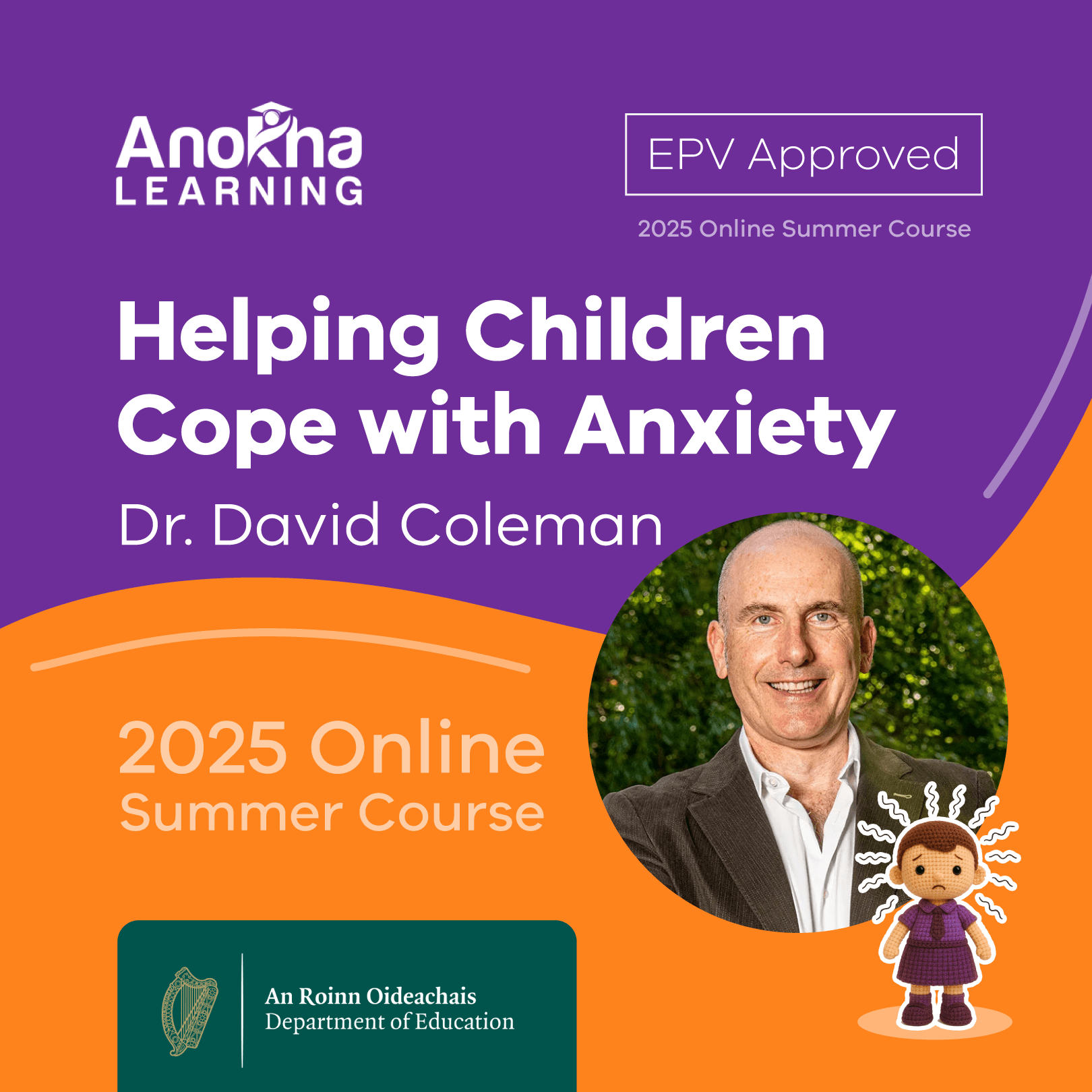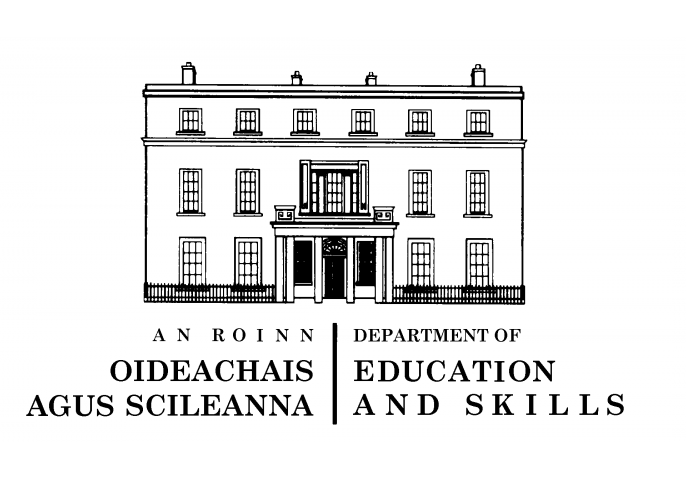A Teachers Insight
We would rather you hear about this course from your peers! "This course has provided me with a huge amount of new resources, ideas and tools for dealing with children with anxiety. Anxiety in children is increasing at an alarming rate. It’s almost like a few years ago, ‘it’ came thundering into every school across the country. At that time, it felt as if teachers were blindsided by it. Slowly but surely, every teacher forum, Facebook support group and staff room were trying to find resources and support to help deal with this increase in anxiety among it’s students. In my opinion, this is the biggest challenge teachers are facing nowadays.
As a SET, I feel confident with helping children learn to read or do maths. It may be a slow process but I know we will get there, even if it is just the basics. I feel equipped and qualified to deal with this. However, when anxiety and mental health became a bigger issue, I began to feel out of my depth. didn't have the proper qualifications or expertise to deal with this. Thankfully more and more information, resources and courses are being made available to teachers on this matter.
In my opinion, this course has been the most relevant and helpful to date. It has greatly increased my level of confidence to deal with children presenting with anxiety. The videos, resources and discussion forums have proven to be invaluable sources of information. It provides a framework on how teachers can approach dealing with these children in a compassionate, empathetic and informed manner. I love the idea of children understanding how their brain works and the upstairs/downstairs brain. I look forward to using some of the techniques outlined in this course such as, breathing exercises, guided visualisation, fear factor scale, behavioural experiments, followed by reflecting on them and many more. The whole topic of childhood anxiety is an area I find particularly interesting. I look forward to using the resources outlined in this course and continuing to research this area. I would like to thank David for this amazing course, and the etutors for all suggestions and feedback throughout the discussion forums." Karen

Course Structure
20 hours of learning. Participants must complete 10 hours of online learning and 10 self-verified hours (module exercises, resources, discussion forum and reflective learning log). Technical Support provided.
Compulsory elements - 2 discussion forum posts per module, Reflective Learning assignment, creation of personal learning record. You must complete the required time on the course before a certificate can be issued.

All Anokha Learning Summer Courses for Teachers have been approved by the Department of Education & Skills for EPV Certification. Start and completion dates printed on your Cert.
EPV days awarded as follows:
1 course – 3 EPV days, 2 courses – 4 EPV days , 3 courses – 5 EPV days
If you buy two or more courses you must only complete one course at a time.

Duration
For 2025 our courses will commence on Tuesday 1st July, and all courses must be completed by 5 pm on Friday 18th July. If you buy two or more courses you must only complete one course at a time. As per the DES criteria you must complete the required time on the course and your start and completion dates will be printed on your Cert for your EPV days.
"WOW! What can I say about this course! It was amazing. It shouldn't be an option for teachers, it needs to be compulsory! This is not only a course that will help children but also helps teachers to help themselves. The value of the knowledge from this course is unquantifiable. I look forward to implementing the skills and knowledge learned here in my everyday teaching! Thank you to David Coleman and the entire team for a brilliant course!" Bernadette
"I found that this course really broadened my understanding of anxiety, the causes, the symptoms, the statements and the science behind it. There is a great chance to interact and see the other participants' feedback via the discussion forum which occurs after each online lecture. I would definitely recommend it to teachers of all ages as I believe it gives you a new perspective to teaching." Clíodhna
"Anxiety is a growing issue in our classrooms. I felt the course provided us with some theoretical knowledge so we have a better understanding about what may be behind the feelings our children are experiencing. The modules then provided us with clear, helpful and practical tools to intervene and help the child to manage their anxiety while supporting the parents with their child too." Joanne
"I found the course to be extremely good, well put together and easy to understand. There was a lively discussion page and it was like double learning - there was input from David Coleman, various tutors and also the other people doing the course. I can honestly say I got so much from everyone involved." Michelle
"The subject matter, the format and the accessibility of this course were excellent. Now, more than ever, this knowledge and expertise needs to be available to all teachers and all professionals working with children. When we return to our schools there will be anxious children, parents and staff. We need to prepare for this. Courses such as these will go a long way in facilitating that preparation." Breedge
"I thoroughly enjoyed this course and it will certainly impact my teaching in the future. It has given me a much better understanding of anxiety and how we can help our students when we return in September. The course was not only informative but it was also enjoyable. David was so easy to listen to and the discussion forums were full of lots of great ideas and resources." Niamh, Mentoring Múinteoir.
"This course was excellent and one that I would highly recommend! I have learned new strategies to work with children presenting with anxiety and feel much better equipped returning to school. It was a most enjoyable course with great resources and engagement from the tutors. Thank you!" Maureen
Course Modules
How can I tell if a child has problematic anxiety? This module introduces you to anxiety, what it looks like in children and teenagers, in terms of their feelings, their thinking, their actions, and their physical selves. It compares “normal” or typical worries that children have to the kinds of anxiety that can be problematic. It also introduces the concept of a Cognitive Behavioural Therapy model to help us structure the help we can offer.
How children’s emotional understanding impacts anxiety. We look at how children process their emotions, including anxiety, showing how children’s anxious feelings can get “bottled up”. We then look at how those bottled up anxious feelings will impact a child’s inner emotional world. We cover the concept of empathy and what it looks and sounds like when we use it with children to help them create congruent emotional experiences that fit with their experiences of the world.
Understanding how a child’s brain processes anxiety. We cover the concept of the “upstairs” or “thinking” brain and how it has evolved to be involved in rational thought, planning, judging risk, problem-solving and mediating our impulsivity. We also look at the concept of the “downstairs” or “feeling” brain and how it is involved in our instinctive responses to stimuli, our strong and intense feelings (love, hunger, fear, anger, etc.). We use this understanding to learn how children then perceive and deal with risk. (with thanks to Dr Dan Siegel for the "upstairs, downstairs" analogy!)
Addressing a child’s anxious behaviour. We cover the effect that role-modelling will have on children’s or teenager’s anxiety. We explore the four most likely behavioural responses a child will have to anxiety. We learn how to help children be more in touch with their bodies, and use physical activity to relieve anxiety. We cover the “zone of proximal development” such that it can guide us in creating the right kind of behavioural experiments for children to challenge their anxious thoughts or behaviours.
Helping children to respond to the physical symptoms of anxiety. We focus on understanding the physicality of anxiety, giving you the skills to teach a child about what is happening in their body and two techniques that they can use to reduce their levels of adrenaline, such that they physically feel less anxious.
Resolving adult anxiety so we can help children resolve theirs. We look at how adults can become more aware of their own anxieties (that might be making children’s anxieties worse). We learn a whole series of effective stress/anxiety reduction techniques that adults can use to deal with their own anxieties, freeing them up to be better able to support children’s worries.
How a child’s cognition affect anxiety. We look at the impact of thinking on a child’s subsequent behavior and feelings. We cover what kinds of thinking patterns a child might be stuck with that could increase anxiety and look at ways to help a child to challenge and overcome common anxious thoughts, including two specific techniques to help them be more in charge of their thinking.
We look at a range of common anxiety disorders that might indicate a child needs more help than we can offer. Specifically, we explore OCD, Separation Anxiety Disorder, Panic Disorder, Selective Mutism and a range of Phobias.
About Dr David Coleman
I’m a clinical psychologist, specialising in working with children, teenagers and their families with over 20 years experience. I’m also an Adjunct Associate Professor in the School of Psychology, UCD.
The heart of my work is my clinical practice and I meet with children and teenagers with a whole host of psychological issues ranging from anxiety, to self-harm, bullying, social isolation, school related difficulties, family conflict, challenging behaviour, abuse related trauma, coping with chronic medical issues and sometimes work exclusively with parents on their parenting of their family.
I’ve written three books about parenting children and teenagers. Many of you might know me, however, from my media related work and I have made television programmes dealing with parenting, child development, teenagehood, bullying. I still give expert opinions on shows like Ireland AM, Today with Maura and Daithi, RTÉ Primetime and Growing Up Live. I write a feature column in the Irish Independent, every Wednesday, providing expert commentary on children, teenagers and family life. I am also the regular, expert, contributor on the "Today with Claire Byrne" show, on RTÉ Radio 1, on parenting and child and adolescent wellbeing and development.
I'm delighted to have written my first online course 'Scared Kids Helping Children to Cope with Anxiety'. It was an exciting project produced in collaboration with Anokha Learning. It's for parents, teachers and others working or living with children, about helping children and teenagers to cope with anxiety.

